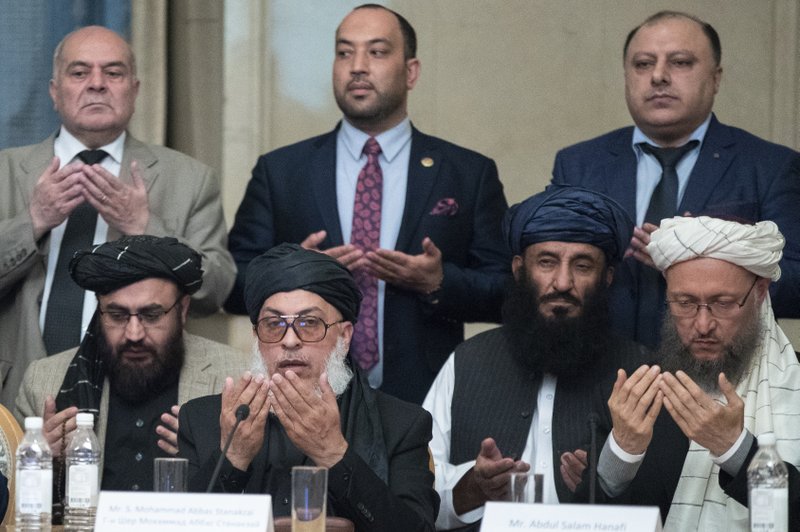MOSCOW -- A Taliban official said Wednesday that the United States has promised to withdraw half its troops from Afghanistan by the end of April, but the U.S. military said it has received no orders to begin packing up.
Taliban official Abdul Salam Hanafi, speaking on the sidelines of a meeting in Moscow between prominent Afghan figures and Taliban representatives, said officials promised the pullout will begin this month.
"The Americans told us that from the beginning of February to the end of April, half of the troops from Afghanistan will be withdrawn," Hanafi said.
However, Pentagon spokesman Army Col. Rob Manning said American defense officials had not received orders to start withdrawing.
"Peace talks with the Taliban continue, but [the Defense Department] has not received a directive to change the force structure in Afghanistan," Manning said.
Hanafi said both the U.S. and the Taliban would create technical committees that "will work on a timetable for the withdrawal of remaining troops."
Pentagon officials say they have no orders to withdraw troops. But in anticipation of such an order in the future, given the achievement of what it calls a "framework" for potential peace negotiations between the Taliban and the Afghan government, military planners have been considering ideas for how a pullout might be conducted.
The two-day talks in the Russian capital that wrapped up Wednesday sidelined the government of Afghan President Ashraf Ghani.
Afghanistan's former president, Hamid Karzai, was involved in the meeting and hailed the discussions, saying the participants shared a desire for peace and stability and opposition to foreign intervention.
"We are happy with the outcome of the meeting," Karzai said.
Speaking after the Moscow meeting, the head of the Taliban delegation, Mohammad Abbas Stanikzai, said talks on the U.S. withdrawal were continuing.
"We are in negotiations with the American side and we are trying that the American forces should go out as soon as possible," Stanikzai said. "The timeline is not fixed so far, it is not agreed upon, but we are negotiating this."
Efforts to find a negotiated end to Afghanistan's longest war have accelerated since the September appointment of Zalmay Khalilzad as Washington's peace envoy. He has held several meetings with the Taliban.
Talks have mostly focused on a U.S. troop withdrawal and guarantees from the Taliban that Afghanistan would not again be used as a safe haven for terrorists to attack other countries, according to both Khalilzad and Taliban officials.
Late Tuesday, Ghani spoke with U.S. Secretary of State Mike Pompeo in an apparent bid to reassert his authority as Washington accelerates its negotiations with the Taliban.
In his State of the Union speech Tuesday, President Donald Trump said his administration is holding "constructive talks" with the Taliban and other Afghan groups, and that "as we make progress in these negotiations, we will be able to reduce our troops' presence and focus on counterterrorism."
Ghani tweeted that Pompeo "stressed that our military partnership is unwavering and will remain until a lasting and inclusive peace is achieved." Ghani said that Pompeo also "underscored the central importance of ensuring the centrality of the Afghan government in the peace process" and signaled support for holding Afghan presidential elections in July.
"We both agreed that words, rumors, and speculations cannot replace actions and that our partnership and resolve will remain strong in the pursuit of peace," Ghani tweeted.
Karzai appeared to try to deflect Ghani's criticism of the Moscow meeting tweeting: "We understand that the government in Kabul needs to be a part of these negotiations. We wish that they would have been here today." Karzai said he was responding to a question from the media in Moscow.
The deep divisions within the many entities in Kabul highlight the difficulty of finding a negotiated end to a war that has already cost the United States more than 2,400 lives and $1 trillion. Yet 18 years on, the Taliban control or hold sway in roughly 50 percent of the country and carry out near daily attacks, mostly targeting the country's security forces.
"We do not know whether we will achieve an agreement -- but we do know that after two decades of war, the hour has come to at least try for peace," Trump said in his State of the Union address.
Robert Palladino, deputy spokesman at the State Department, said Pompeo reaffirmed the U.S. commitment to achieving a lasting peace. Pompeo also emphasized the importance of an intra-Afghan dialogue and the role of a cease-fire in ending the violence and making it possible for the Afghan government, other Afghan leaders and the Taliban to negotiate a political settlement, Palladino said.
Information for this article was contributed by Kathy Gannon, Robert Burns, Vladimir Isachenkov and Rahim Faiez of The Associated Press.
A Section on 02/07/2019
